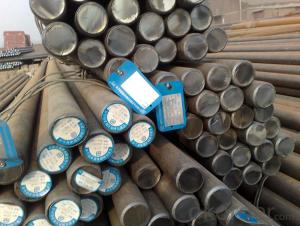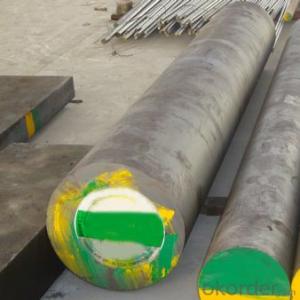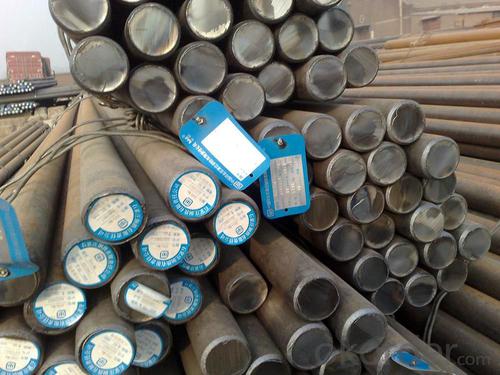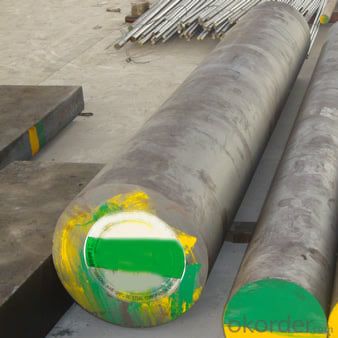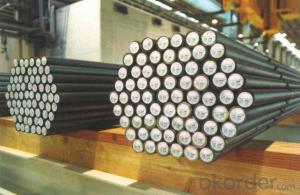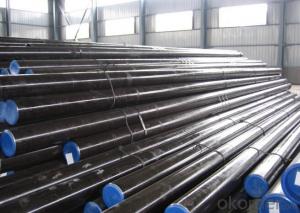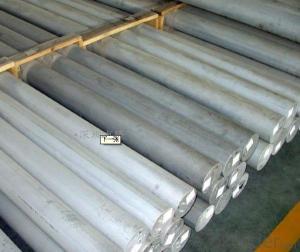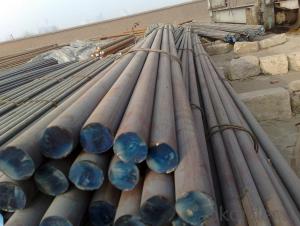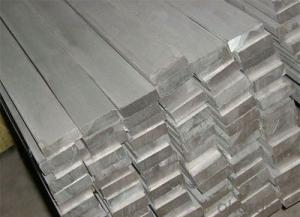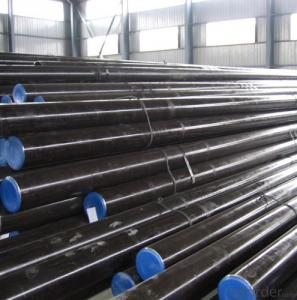Special Steel 5160 Spring Steel Round Bars
- Loading Port:
- China main port
- Payment Terms:
- TT OR LC
- Min Order Qty:
- 25 m.t.
- Supply Capability:
- 10000 m.t./month
OKorder Service Pledge
OKorder Financial Service
You Might Also Like
Specification
The details of our Steel
1. Produce Standard: as the GB, AISI, ASTM, SAE, EN, BS, DIN, JIS Industry Standard
2. Produce processes: Smelt Iron -EAF smelt Billet - ESR smelt Billet -Hot rolled or forged get the steel round bar and plate
3. Heat treatment:
Normalized / Annealed / Quenched+Tempered
4. Quality assurance:
All order we can received Third party inspection, You can let SGS, BV,.. and others test company test and inspect our products before Goods shipping.
Product information
Chemical Composition(%) of forged 5160 bar | ||||||||
Steel Grade | C | Si | Mn | S | P | Cr | Ni | V |
5160 | 0.56-0.61 | 0.15-0.35 | 0.75-1.00 | ≤0.035 | ≤0.040 | 0.70-0.90 | ≤0,35 | - |
Specification(mm) of forged 5160 bar | ||||||||
ROUND BAR: 5-40*2000-4000 PLATE: 50-400*200-810*2000-4000 | ||||||||
Main product
High speed steel | |
AISI | M2,M4,M35,M42,T1 |
DIN | 1.3343,1.3243,1.3247,1.3355 |
JIS | SKH51,SKH54,SKH35,SKH59,SKH2 |
Cold work tool steel | |
AISI | D2,D5,D3,D6,A8,A2,O1 |
DIN | 1.2379,1.2601,1.2080,1.2436,1.2631,1.2363,1.2510,1.2327 |
JIS | SKD10,SKD11,SKD1,SKS3 |
Hot work tool steel | |
AISI | H13,H11,H21 |
DIN | 1.2344,1.2343,1.2367,1.2581,1.2713 |
JIS | SKD61,SKD6,SKD7,SKD5SKT4 |
Plastic mould steel | |
AISI | P20,P20+Ni,420 |
DIN | 1.2311,1.2738,1.2083,1.2316 |
JIS | PDS-3,SUS420J1,SUS420J2 |
Alloy structural seel | |
AISI | 5140,4340,4135,4140 |
DIN | 1.7035,1.6511,1.7220,1.7225 |
JIS | SCr440,SNCM439,SCM435,SCM440 |
Stainless steel | |
AISI | 440C,420,430 |
DIN | 1.4125 |
JIS | SUS440C |
Carbon steel | |
AISI | 1045,1020 |
DIN | 1.1191 |
JIS | S45C, G3101 |
Product show

Workshop show

Shipping
1. FedEx/DHL/UPS/TNT for samples, Door-to-Door;
2. By Air or by Sea for batch goods, for FCL; Airport/ Port receiving;
3. Customers specifying freight forwarders or negotiable shipping methods!
Delivery Time: 3-7 days for samples; 5-25 days for batch goods.
Payment Terms
1.Payment: T/T, L/C, Western Union, MoneyGram,PayPal; 30% deposits; 70% balance before delivery.
2.MOQ: 1pcs
3.Warranty : 3 years
4.Package Informations: 1) EXPORT, In 20 feet (GW 25 ton) or 40 feet Container (GW 25 ton)
2)as customer's requirement
Why choose us?
(1) The leading exporter in China special steel industry.
(2) Large stocks for various sizes, fast delivery date.
(3) Good business relationship with China famous factories.
(4) More than 7 years steel exporting experience.
(5) Good after-sales service guarantee.
- Q: Can special steel be used for making automotive engine components?
- Automotive engine components can indeed be crafted using special steel. Due to its remarkable strength, durability, and resistance to wear and corrosion, special steel is frequently employed in the manufacturing process. Engine components like crankshafts, connecting rods, camshafts, and valves necessitate materials capable of enduring high temperatures, pressures, and mechanical stresses. Special steel, encompassing high-strength alloy steel or stainless steel, fulfills these requirements and grants the essential performance characteristics for automotive engines. Furthermore, special steel presents the added advantage of reducing weight, thus contributing to improved fuel efficiency and engine performance. All in all, special steel emerges as a fitting material choice for automotive engine components, thanks to its exceptional mechanical properties and capacity to withstand the demanding conditions under which engines operate.
- Q: How does stainless steel contribute to the construction industry?
- Stainless steel contributes to the construction industry by providing durability, corrosion resistance, and aesthetic appeal. It is widely used in structural applications, such as building facades, bridges, and roofing, as it can withstand harsh weather conditions and maintain its strength over time. Stainless steel's resistance to corrosion also makes it a suitable choice for plumbing, electrical, and HVAC systems, ensuring longevity and minimizing maintenance. Additionally, its sleek and modern appearance enhances the overall aesthetics of architectural designs.
- Q: Can special steel be used for electrical applications?
- Yes, special steel can be used for electrical applications. Special steels such as electrical steel or silicon steel are specifically designed for use in electrical equipment and applications. These steels have low electrical resistivity and high magnetic permeability, making them ideal for use in transformers, motors, generators, and other electrical devices that require efficient electricity conduction and magnetic properties.
- Q: What are the corrosion resistance properties of special steel?
- Special steel has excellent corrosion resistance properties due to the addition of specific alloying elements such as chromium, nickel, and molybdenum. These alloying elements create a protective layer on the surface of the steel, preventing the material from reacting with its surrounding environment. This makes special steel highly resistant to corrosion, even in harsh conditions such as exposure to chemicals, moisture, and high temperatures. Additionally, special steel can retain its corrosion resistance properties over long periods, making it a reliable choice for various applications in industries such as construction, automotive, and aerospace.
- Q: How does free-cutting steel improve machinability?
- Free-cutting steel improves machinability by having a higher sulfur content, which acts as a lubricant during the machining process. This reduces friction and heat generation, leading to improved chip formation and easier cutting, resulting in higher cutting speeds, improved surface finish, and extended tool life.
- Q: What are the challenges in forming special steel?
- Forming special steel poses several challenges due to its unique characteristics and properties. Some of the main challenges include: 1. High melting point: Special steels often have high melting points, which require specialized equipment and processes to heat and form the material. This can lead to increased energy consumption and cost. 2. Alloy composition: Special steels are typically alloyed with various elements to enhance their properties, such as strength, hardness, and corrosion resistance. However, the precise control of alloy composition can be challenging, as minor variations can significantly affect the material's properties. 3. High carbon content: Certain special steels, such as tool steels, contain high carbon content to enhance hardness and wear resistance. However, this high carbon content makes the material more prone to cracking during forming processes like forging or rolling. Special care must be taken to prevent these cracks and ensure the desired shape is achieved. 4. Heat treatment requirements: Special steels often require specific heat treatment processes, such as quenching and tempering, to achieve the desired mechanical properties. These processes can be complex and require precise control of temperature, time, and cooling rates. Failure to properly carry out heat treatment can result in poor material performance or even structural failure. 5. Surface finish and dimensional accuracy: Special steels are often used in applications where surface finish and dimensional accuracy are critical, such as in the aerospace or automotive industry. Achieving the required surface finish and dimensional accuracy during forming operations can be challenging, requiring advanced tooling and precision machining techniques. 6. Specialized equipment and expertise: Special steels may require specialized equipment and expertise to form, such as high-pressure hydraulic presses, induction heating equipment, or vacuum furnaces. These specialized tools and processes add complexities and costs to the manufacturing process. Despite these challenges, forming special steels is essential in various industries where their unique properties are required. Manufacturers continuously invest in research and development to overcome these challenges and improve the forming processes of special steels.
- Q: How is corrosion-resistant steel different from regular steel?
- Corrosion-resistant steel, also known as stainless steel, differs from regular steel primarily due to the presence of chromium. Regular steel is prone to rust and corrosion when exposed to moisture and oxygen, while corrosion-resistant steel contains a minimum of 10.5% chromium, which forms a protective layer on its surface, preventing rust and corrosion. This additional element makes corrosion-resistant steel highly durable, long-lasting, and suitable for various applications where exposure to moisture or corrosive environments is a concern.
- Q: How does special steel perform in corrosive environments?
- The purpose of special steel is to excel in corrosive environments. This is achieved by incorporating a greater amount of alloying elements, like chromium, which generates a safeguarding oxide layer on the steel's surface. By doing so, the steel is shielded from direct contact with the corrosive elements present in the environment. In addition, special steel may contain other alloying elements such as molybdenum, nickel, or copper, which further enhance its ability to resist corrosion. These elements contribute to the steel's capacity to withstand various types of corrosion, including pitting, crevice corrosion, and stress corrosion cracking, which are commonly observed in corrosive environments. Moreover, special steel often undergoes treatments with diverse surface coatings or finishes that offer additional defense against corrosion. These coatings encompass materials like zinc, epoxy, or polymers, which establish an extra barrier between the steel and the corrosive elements. To summarize, special steel delivers exceptional performance in corrosive environments due to its abundant alloying elements, protective oxide layer, and supplementary surface coatings. It provides remarkable resistance against different forms of corrosion and guarantees the durability and dependability of structures or equipment operating in such environments.
- Q: How is special steel used in the manufacturing of tools and dies?
- Special steel is used in the manufacturing of tools and dies due to its exceptional properties, such as high strength, hardness, and wear resistance. These steels can withstand extreme temperatures and pressures during the forming, cutting, and shaping processes. They also have excellent dimensional stability, ensuring precise and accurate tooling. Special steel's unique composition and heat treatment capabilities allow for the production of durable and long-lasting tools and dies, which are essential for various industries like automotive, aerospace, and manufacturing.
- Q: What are the main applications of special steel in the mining transportation?
- Special steel is extensively used in mining transportation for various applications. The main applications include manufacturing durable and high-strength components such as drill bits, conveyor belts, and mining equipment parts. Special steel's exceptional resistance to wear, corrosion, and impact makes it an ideal choice for these demanding environments. Additionally, special steel is used in the construction of infrastructure, such as bridges and railway tracks, ensuring the safe and efficient transportation of mined materials.
Send your message to us
Special Steel 5160 Spring Steel Round Bars
- Loading Port:
- China main port
- Payment Terms:
- TT OR LC
- Min Order Qty:
- 25 m.t.
- Supply Capability:
- 10000 m.t./month
OKorder Service Pledge
OKorder Financial Service
Similar products
Hot products
Hot Searches
Related keywords
